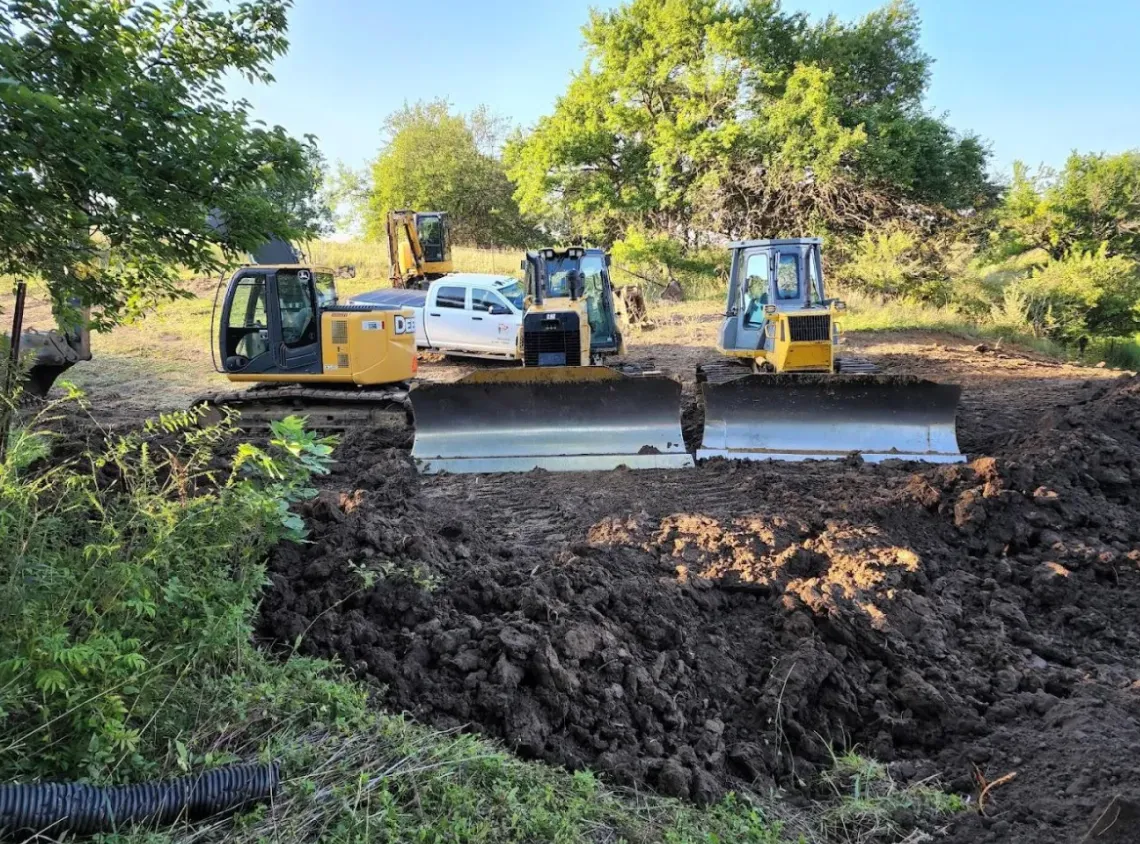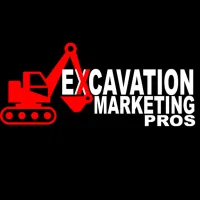Licensed, Bonded & Insured | Family Owned & Operated
049-012803 IL | IL Pumping License: 054-021753 | IA Pumping License: 12839
22 YRS. EXPERIENCE, FULL SITE PREP EXPERTS - HOW CAN WE HELP?

Land Clearing near Rock Island County
Wet Soil. Roots. Regulations. The Real Problems of Land Clearing in Rock Island County
If you’ve got a piece of land in Rock Island County and you’re thinking, “Let’s just clear it out and get started,” we get it. Maybe it’s a future home site. Maybe you want pasture space or you’re preparing for a new building. Either way, the idea sounds simple enough: remove the trees, scrape the surface, and call it good.
But if you've ever tried to tackle land clearing on your own — or hired someone who promised it’d be fast and easy — you probably found out the hard way that it doesn’t always go according to plan.
We’ve worked with homeowners, farmers, and developers across Rock Island, Henry, Knox, Mercer, and Muscatine Counties for years, and we’ve seen the same headaches pop up again and again. Wet ground. Thick roots. Confusing rules. It’s enough to slow any job down — or stop it altogether.
So if you're feeling overwhelmed or just trying to figure out what you're getting into, you're not alone. Let's walk through the real problems you might face during a land clearing job in our area — and how to get ahead of them.
Problem #1: Wet Soil and Drainage Headaches
Let’s start with the obvious. This part of Illinois gets a fair amount of rain and snow, and that water doesn’t just disappear. It soaks in. And depending on the slope, the type of soil, and how long the land’s been untouched, you could be dealing with mud pits under grass that looks solid.
Here’s what we’ve seen:
A homeowner wants a wooded lot cleared in spring… and our dozer sinks halfway in.
A new property owner tries to run equipment after a heavy rain, only to trench the soil into a mess.
Projects delayed for weeks because the site just won’t dry out.
Why it matters:
Wet soil doesn’t just slow us down — it can damage machinery, compact the earth in ways that mess up future building plans, and turn your job site into a giant puddle. Certain soils in Rock Island County, especially in low-lying or wooded areas, hold moisture longer than you'd expect.
What to do:
Plan around the seasons. In our region, late summer and early fall are often the driest, most reliable times for land clearing. If you’re unsure, we can walk the site with you and check the soil before committing to a timeline.
Problem #2: Stubborn Tree Roots and Brush That Just Won’t Quit
You see trees. We see what's under them.
That beautiful old oak? It’s got a root system that stretches way out beyond the drip line. And that overgrown thicket of brush? It’s likely hiding small stumps, buried debris, and root networks that’ll destroy your average rental skid steer.
Here’s what we’ve dealt with:
Property owners renting equipment for a weekend… and quitting halfway through because the roots “just won’t let go.”
Land that looks “mostly cleared” until it rains — and the roots swell, pushing up through the surface again.
Brush piles that refuse to burn, especially after rain.
Why it matters:
Roots take time. Even with the right equipment, removing root balls without damaging the soil around them takes experience. And if you don’t get them out fully, they’ll rot underground or resprout.
What to do:
Don’t just clear what’s on top. You need a plan for what’s below the surface, too. We often use a mix of machines like excavators with root rakes, or dozers with shear blades — depending on what the land is giving us. And yes, sometimes we even bring in forestry mulchers or haul it all offsite.
Problem #3: Permits, Zoning, and Land Use Regulations in Rock Island County
Let’s talk about the not-so-fun stuff: paperwork.
One of the biggest surprises for folks trying to clear land is finding out they need permits or special approvals — even just to remove trees or grade soil. It depends on where you live in Rock Island County, whether your property sits inside a city or village boundary, and what you’re planning to do after clearing.
Here’s what catches people off guard:
Clearing near waterways or wetlands? You may need approval from DNR or the county.
Planning to burn debris? There are burn restrictions based on wind, season, and local rules.
Doing any grading? It might affect drainage — and that can lead to neighborhood complaints or fines if done wrong.
Why it matters:
If you move forward without the right approvals, you risk getting hit with stop-work orders, fines, or even legal trouble. We've seen people have to undo land work they already paid for.
What to do:
Start with a call to your township or county zoning office. And if you’re not sure what’s allowed, ask us. We’ve worked with local inspectors and officials for years, and we can help guide you before you start.
How Bad Planning Wastes Time and Money
Every season, we get calls from folks who started a land clearing job — either by themselves or with someone they hired cheap — and now need help fixing the mess.
Common mistakes we’ve seen:
No site walk before equipment shows up
Skipping underground utility locates (“call before you dig” isn’t just a suggestion)
Trying to save money by hiring someone without insurance or experience
No clear plan for debris removal or stump grinding
And we get it — you’re trying to move fast or keep costs down. But bad planning almost always ends up more expensive in the long run.
How We Handle These Land Clearing Challenges at Triple D Excavating Co.
We’re not a huge outfit, but we’ve been doing land clearing across Rock Island, Henry, Knox, Mercer, and Muscatine Counties long enough to know that every job needs a plan that fits that piece of land — not a one-size-fits-all approach.
Here’s how we usually approach things:
Walk the site with the client – we look for wet spots, drainage patterns, debris, and access issues.
Call utility locates before we ever put a bucket in the ground.
Match the right machines to the job – whether that’s a dozer, excavator, forestry mulcher, or all three.
Handle haul-off or debris piles properly – especially if burn bans are in effect.
Coordinate with local officials – when permits or erosion control are needed.
We’re not here to boast. Just saying — when you’ve cleared everything from open pastures to overgrown lots with 50 years of root growth, you learn how to do it the right way the first time.
What You Can Do to Make Your Land Clearing Project Go Smoother
Even if you haven’t hired a contractor yet, here’s what you can do to help the job go better:
Mark what you want to keep – Trees, rocks, paths — if it matters to you, flag it.
Know your goal – Are you clearing to build, farm, pasture, or sell? It changes the approach.
Give access – Make sure there’s a way to get equipment in and out.
Be realistic about timing – A “simple” job can still take days, especially if the weather’s been rough.
Ask questions – A good contractor won’t mind explaining how and why things are done.
Final Thoughts: Why the “Easy Land Clearing Job” Often Isn’t
If you’re staring at an overgrown property and wondering where to start — or maybe frustrated because your timeline just got wrecked by mud, roots, or red tape — know this: You’re not the first to run into these problems. And you won’t be the last.
Land clearing in Rock Island County can be unpredictable. But with the right plan, the right crew, and a little patience, it can go smoothly.
At Triple D Excavating Co., we’re here to make sure it does. We won’t promise it’ll be quick or perfect, but we will promise we’ll do it right — and treat your land like it’s our own.

AVOID COSTLY MISTAKES:
Do NOT hire an excavating contractor without first reading our free guide:
The ULTIMATE Excavation & Septic "Success Guide."

We Offer Excavation Services NearYou!
If you don't see your specific area, contact us and we may still be able to help or give a referral.
All rights reserved | Privacy policy



